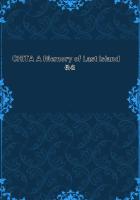A further proof that the conclusion must be the development of necessary premisses is as follows. Where demonstration is possible, one who can give no account which includes the cause has no scientific knowledge. If, then, we suppose a syllogism in which, though A necessarily inheres in C, yet B, the middle term of the demonstration, is not necessarily connected with A and C, then the man who argues thus has no reasoned knowledge of the conclusion, since this conclusion does not owe its necessity to the middle term; for though the conclusion is necessary, the mediating link is a contingent fact. Or again, if a man is without knowledge now, though he still retains the steps of the argument, though there is no change in himself or in the fact and no lapse of memory on his part; then neither had he knowledge previously. But the mediating link, not being necessary, may have perished in the interval; and if so, though there be no change in him nor in the fact, and though he will still retain the steps of the argument, yet he has not knowledge, and therefore had not knowledge before. Even if the link has not actually perished but is liable to perish, this situation is possible and might occur. But such a condition cannot be knowledge.
When the conclusion is necessary, the middle through which it was proved may yet quite easily be non-necessary. You can in fact infer the necessary even from a non-necessary premiss, just as you can infer the true from the not true. On the other hand, when the middle is necessary the conclusion must be necessary; just as true premisses always give a true conclusion. Thus, if A is necessarily predicated of B and B of C, then A is necessarily predicated of C. But when the conclusion is nonnecessary the middle cannot be necessary either.
Thus: let A be predicated non-necessarily of C but necessarily of B, and let B be a necessary predicate of C; then A too will be a necessary predicate of C, which by hypothesis it is not.
To sum up, then: demonstrative knowledge must be knowledge of a necessary nexus, and therefore must clearly be obtained through a necessary middle term; otherwise its possessor will know neither the cause nor the fact that his conclusion is a necessary connexion.
Either he will mistake the non-necessary for the necessary and believe the necessity of the conclusion without knowing it, or else he will not even believe it-in which case he will be equally ignorant, whether he actually infers the mere fact through middle terms or the reasoned fact and from immediate premisses.
Of accidents that are not essential according to our definition of essential there is no demonstrative knowledge; for since an accident, in the sense in which I here speak of it, may also not inhere, it is impossible to prove its inherence as a necessary conclusion. A difficulty, however, might be raised as to why in dialectic, if the conclusion is not a necessary connexion, such and such determinate premisses should be proposed in order to deal with such and such determinate problems. Would not the result be the same if one asked any questions whatever and then merely stated one's conclusion? The solution is that determinate questions have to be put, not because the replies to them affirm facts which necessitate facts affirmed by the conclusion, but because these answers are propositions which if the answerer affirm, he must affirm the conclusion and affirm it with truth if they are true.
Since it is just those attributes within every genus which are essential and possessed by their respective subjects as such that are necessary it is clear that both the conclusions and the premisses of demonstrations which produce scientific knowledge are essential. For accidents are not necessary: and, further, since accidents are not necessary one does not necessarily have reasoned knowledge of a conclusion drawn from them (this is so even if the accidental premisses are invariable but not essential, as in proofs through signs; for though the conclusion be actually essential, one will not know it as essential nor know its reason); but to have reasoned knowledge of a conclusion is to know it through its cause. We may conclude that the middle must be consequentially connected with the minor, and the major with the middle.













